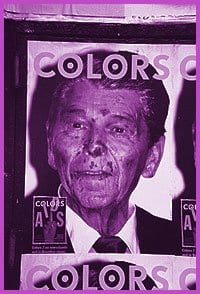Ronald Reagan finally kicked the bucket at 93, putting the US into a mourning frenzy. The Toronto Star reported that people lined the street 12 deep to see the funeral cortege and spontaneously broke into a rendition of “God Bless America” when it passed. Reagan is being tearfully described as the greatest president of the 20th century. The media can talk of nothing else.
I don’t know whether to puke or scream.
I’m one of the generation who somehow managed to live through the first wave of the AIDS epidemic, no thanks to Reagan or his good buddy Brian Mulroney here in Canada. Reagan was the president who fiddled while AIDS burned through our community and established itself around the world. AIDS was first reported by the US Centres For Disease Control only a few months after Reagan’s inauguration in 1981. But throughout the early years of the epidemic, the “great communicator” remained silent.
In 1982, with more than 400 dead, presidential press secretary Larry Speakes responded to questions about AIDS by joking that the president didn’t have it.
In 1985, there were close to 7,000 Americans dead and Reagan was put on the spot by a reporter who asked how he felt about children with AIDS being expelled from schools. The President replied, “I can understand both sides of it.”
In 1987 the death toll was approaching 13,000 and Reagan made his first-ever voluntary public statements about the epidemic, calling for abstinence and mandatory AIDS testing.
Reagan was the role model for Mulroney who didn’t get around to mentioning AIDS publicly until 1989, almost a decade into the epidemic.
In 2001, Reagan’s former surgeon general Everet Koop mused over the administration’s reluctance to deal with the epidemic: “Because transmission of AIDS was understood [to be] primarily in the homosexual population and in those who abused intravenous drugs, the advisers to the president took the stand they are only getting what they deserve.”
So when my friends were dropping like flies, political leaders like Reagan sat on the resources needed for research, treatment and prevention, ensuring that thousands more would be infected and die. Hence, my personal desire to puke in the midst of all this Reagan nostalgia.
But I have to recognize that most of middle America never experienced the devastation of AIDS. Could it be that other than this one little blind spot, Reagan was indeed a great president?
That’s when I want to scream.
Reagan’s military build-up, including his Star Wars fantasies, coupled with huge tax cuts to the richest of the rich, produced the biggest deficit until then in American history. He was a union-buster, firing 11,000 striking air traffic controllers. He supported his party’s anti-abortion stance. He undermined civil rights efforts, supporting tax exemptions for segregated schools, opposing the creation of a holiday to honour Martin Luther King Jr and blocking proposals for sanctions against the racist apartheid regime in South Africa. While he pontificated about the “war on drugs” he was supporting the government of soon-to-be convicted cocaine smuggler Manuel Noriega in Panama. He also colluded with other murderous military regimes in Latin America and his underlings got caught selling arms to Iran to finance the terrorist activities in Nicaragua.
One of his major allies in the Arab world was Saddam Hussein, and it was during Reagan’s term of office that Osama Bin Ladin, (in Reagan’s eyes, a freedom fighter), was first put on the American payroll to attack the Russians in Afghanistan.
But in the wake of this disastrous legacy all we are hearing about are Reagan’s charisma, charm, wit and that he happened to be around when the Soviet Union finally imploded. Hello?
Reagan was a B-grade actor who played the role of a kind, brave, wise and judicious father of the nation, a kind of Ward Cleaver in The West Wing, with a touch of John Wayne.
“What do you expect?” my friends ask, when I grumble about the news coverage. “Most Americans have difficulty distinguishing between sitcoms and the real world at the best of times.”
But I refuse to believe that Americans could be that stupid.I want to scream, because I see the deluge of Reagan nostalgia not as another example of American idiocy but a calculated effort by the present US administration and its media machine. They actually like what Reagan did and want to do more of it, and, like directors in a Hollywood melodrama who pump up the music to produce the right emotional effect, they are using Reagan nostalgia for their own political purposes. Remember, daddy George Bush was Reagan’s vice president, and George Junior, a chip off the Reagan block, has got himself into a pretty pickle by following Reaganesque policies in terms of military spending, tax cuts for the rich and foreign adventures. Now he’s trying to save his sorry butt by preaching family values (not our families however) and whipping up nostalgia for the good old days under the Gipper.
So just in case anybody is actually listening south of the border, from the point of view of queers, women, minorities, people living with AIDS and those fighting for democracy in the developing world, Reagan was perhaps one of the worst presidents in American history, and those who are now so ostentatiously singing his praises are not the kind of people you would ever want to vote for.
* Tim McCaskell is a long-time Toronto AIDS activist.

 Why you can trust Xtra
Why you can trust Xtra


